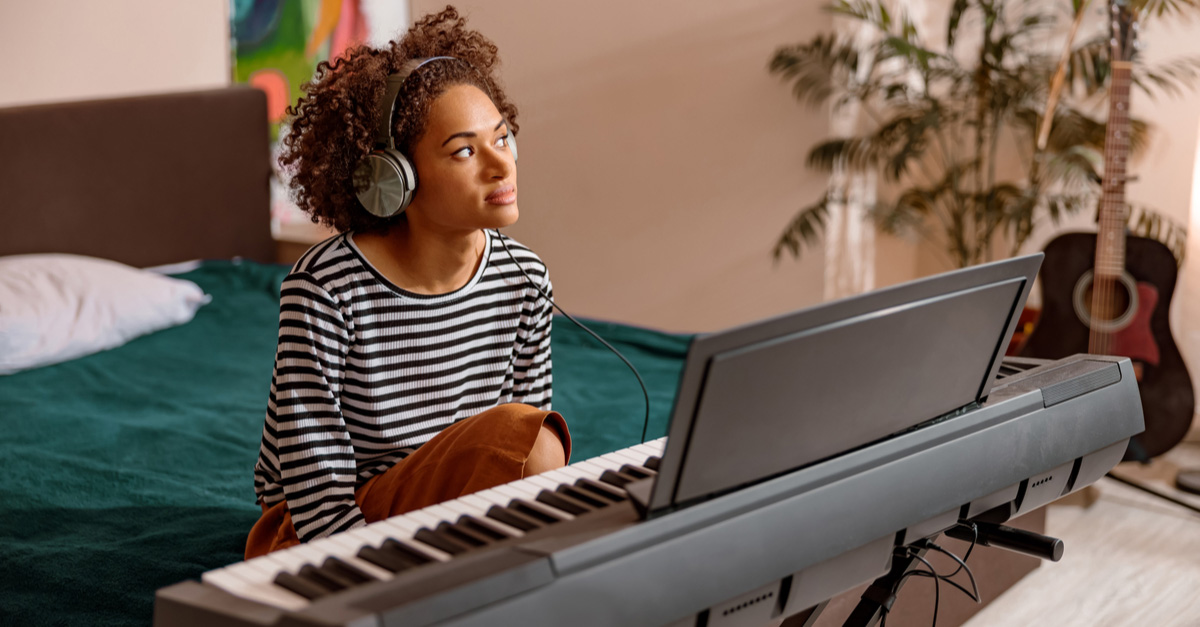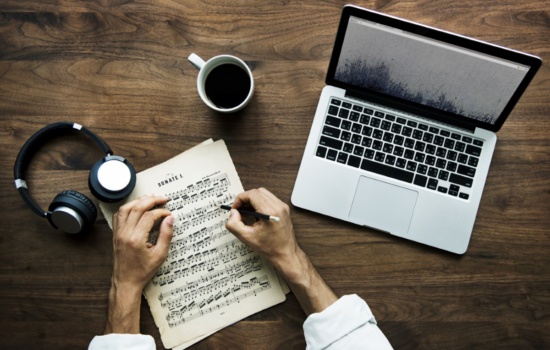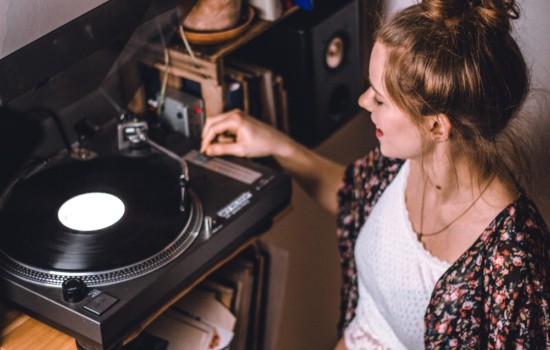Music Career Finder
Survey Start
Music Publishing Explained: How Artists Get Paid for their Songs

- Music publishing involves collecting and paying royalties to songwriters/composers and finding opportunities for songwriters/composers
- A music publisher registers songs with royalty collection organizations, copyrights songs, gets songs on TV, and arranges co-writes between songwriters
- Music publishers don’t usually own songs, they mainly just collect royalties, taking their cut of revenue or recouping an advance they’ve paid a songwriter
- A music publishing company collects mainly mechanical royalties, performance royalties, and sync license fees
- Introduction
- What Is Music Publishing?
- What Does a Music Publisher Do?
- Why Have a Music Publisher?
- Music Copyright Basics
- Intellectual Property
- Do Music Publishers Own Songs?
- Split Sheets
- Royalty Types
- Mechanical Royalties
- Synchronization (Sync) Licensing
- Performance Royalties
- Print Rights License
- Theatrical License
- Types of Publishers
- Publishing Administrator
- Independent Publisher
- Major Publisher
- Types of Publishing Deals
- Co-publishing Agreements
- Work-for-Hire Agreements
If you want to get paid all the royalties you're owed as a songwriter, you need to understand music publishing.
If you write, arrange, compose, or produce music and you want to earn money from it, this article will explain how to do that via music publishing.
What Is Music Publishing?
What Does a Music Publisher Do?
A music publisher has two main jobs: licensing music and collecting royalties.
“Licensing” here means a publisher will secure opportunities for songwriters they’ve signed.
This can involve:
- Arranging co-writes between songwriters
- Registering songs with Performing Rights Organizations (PROs)
- Copyrighting songs
- Getting songs recorded by artists
- Music promotion assistance
- Distributing songs to streaming platforms
- Placing songs on TV and in films
After a song has been used in one of these ways, the music publisher is responsible for collecting royalties generated from these activities.
Before this, however, a music publisher needs to find promising talent. They want to find songwriters who they believe can write money-making songs or who have already done so.
In exchange for all of this, the publisher will obviously take a percentage of all revenue and royalties generated from songs they’ve signed.
Hey, what do you think about trying our new Music Career HelperMusic Career Helper really quick? It’s totally free and could help get your career moving fast! Give it a try. It’s totally free and you have nothing to lose.
Why Have a Music Publisher?
A music publisher can be a strong partner, helping musicians expand their music careers.
Yes, a publisher takes a cut of a song’s revenue. But the opportunities they can bring songwriters can be career- and life-changing.
They can introduce you to labels and artist managers, and even help you get live gigs through their music industry network. Don’t underestimate the potential for a music publisher to add rocket fuel to your artist development formula.
They also take care of many of the business aspects that songwriters typically don’t want to deal with, like copyrighting music, drawing up contracts, securing placements on TV, and just general administrative work.
Music Copyright Basics
Copyright literally means the “right to copy.”
Copyrights confer exclusive rights to the creator or owner of a work to reproduce (copy), prepare derivative works (adapt), distribute copies to the public, and perform the work publicly.
- If you write down the lyrics and notate the music to a song you made up, the composition is automatically protected by a “simple” or compulsory copyright. If you don’t write it down, it will not qualify for protection under copyright.
- If you record the song you made up, then an additional copyright will apply to the recorded version of the song, known as a master recording copyright.
Music publishers usually only share in the composition rights, not in the master rights (unless they also produced the recording).
Intellectual Property
If you create a piece of music, this is a form of intellectual property (IP) in which some value presumably resides.
When we commercialize IP, it means we are extracting value from it in the form of revenue (money).
Protecting IP from infringement (theft) requires documenting with the government who created it and when it was created. This is typically done through copyrights.
Do Music Publishers Own Songs?
Usually, the music publisher does not own the copyrights to songs created by their songwriters.
Some publishers do take control of the copyright, but always with the explicit approval of the writer.
The music publisher’s role is usually limited to collecting and auditing royalties on behalf of the artist, for which the publisher is paid the publisher’s share or “administration fee.”
The songwriter will typically maintain full control and ownership of the copyright, unless they choose to sell the copyright outright to someone else.
Split Sheets
A split sheet is a document that outlines the percentage of ownership each songwriter, composer, and lyricist has in a song. This makes sure everyone is on the same page (literally and figuratively) about royalty payouts.
It’s a good idea to draft a split sheet before making any recordings, so it’s clear in advance who is entitled to which portion of the rights (rights = royalties).
If there is no split sheet or written agreement in place, the law provides that all contributors will receive an equal share in the proceeds. There have been many court battles over the years resulting from a lack of clear agreements between collaborators.
Royalty Types
Here are the main ways your songs can earn money that would then be collected and paid by your publisher…
Mechanical Royalties
A mechanical license covers agreements with labels, distributors, and publishers and usually stipulates a certain payment for each copy sold or streamed (including when a song is covered).
This generates a mechanical royalty, which is then collected and paid to songwriters and composers by the publisher or publishing admin company.
Synchronization (Sync) Licensing
When music is licensed to be synchronized with moving pictures in a movie, television show, ad, or video game.
Because of their connections with the film industry, a music publisher can get your songs licensed in this way.
This almost always comes with an upfront fee paid by the persons/company making the visual media. The fee is split between the publisher and the songwriter/composer.
Performance Royalties
One of the most common types of music licenses (and therefore music royalties) is a public performance license.
When a songwriter’s song is performed and played in a public setting, that generates a performance royalty.
This royalty is collected by the Performance Rights Organization (PRO) and sometimes a music publisher. If a songwriter doesn’t have a publisher, they can get paid directly from their PRO.
A “public setting” includes:
- Concerts (whether performed by the songwriter or someone else)
- Restaurants
- Bars
- Stores
If a song has been licensed, the songwriter(s) can earn performance royalties from it because TV and streaming platforms are considered a “public performance” of the song.
Print Rights License
As the name implies, the print rights refer to printed copies of sheet music.
It applies to printed sheet music compilations, and whenever printed copies of sheet music for a song are created or reproduced.
These are less common but the royalties generated would usually be collected by a music publisher.
Theatrical License
Widely used in the theater industry, a theatrical license allows for an onstage performance of a song with an audience present.
These are less common but the royalties generated would usually be collected by a music publisher.
Types of Publishers
There are three main types of music publishers you might choose to deal with:
- Publishing administrator
- Independent publisher
- Major publisher
Publishing Administrator
A publishing administrator takes on the somewhat mundane tasks that you don’t want to do as a songwriter.
These tasks include registering your music with PROs (both in your home country and abroad) and tracking royalties in order to pay them to you.
For these services, they take a small percentage of the royalties they collect (usually 10-15%).
They don’t pay writers any advances and they don’t offer any creative services, but they might help you get licensing placements.
If you’re just starting out as a DIY songwriter, they might be the best option.
Independent Publisher
An independent music publisher performs all the administrative work done by a publishing administrator, but they also offer creative services to their songwriters.
This can include music production help, artwork design, and promotion assistance.
They do pay the songwriter an advance, but it’s usually not a large one. In exchange, they ask for a certain number of songs or compositions per time period (usually a year). Their commission will be higher than a publishing admin’s.
Independents are always looking to discover new talent and might be a good option for songwriters who are up-and-coming and intend to make a big splash on the scene.
Major Publisher
A major music publisher would be companies like Universal, Sony, BMG, and Warner Chappell.
They pay out big advances and provide songwriters with a full suite of creative services.
They take a much larger commission, but they’re very involved in aggressively promoting their writers’ music in the marketplace.
They’re typically most interested in signing artists who already have a big following. They want established writers who can be counted on to earn a recurring stream of revenue.
Types of Publishing Deals
Artists often enter into publishing deals where the music publisher acts as administrator, registering works, processing paperwork for synch licenses, and working with other collection entities to collect royalties and distribute these to the artist.
Some of these deals might pay an advance to the artist, which the publisher will recoup from the earnings stream.
The publisher’s share is negotiated in this case, and would usually be from 15% to 25%.
There are two main types of music publishing deals…
Co-publishing Agreements
A co-publishing agreement is when the artist gives up a larger share of royalties and control in order to incentivize the publishing company to pitch music supervisors, labels, and popular artists.
The company will also help develop the writer’s professional career by setting up co-writes with other songwriters and having the artist perform at industry showcases, in addition to handling all the administrative tasks.
Co-publishing deals pay a cash advance, which will need to be recouped by the company before additional royalties are paid to the artist.
Work-for-Hire Agreements
A work-for-hire agreement is when creators offer to write and record material for other artists or companies for a flat fee.
In this case, you would be signing away all future rights to a song, and might not be credited as the composer, since whoever hired you would be listed as the writer.





